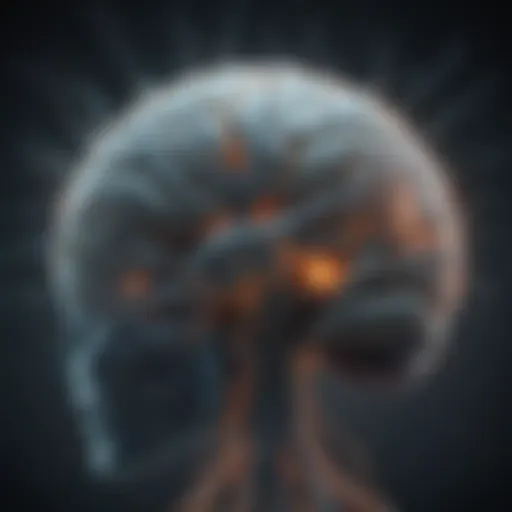Unveiling the Life and Impact of Erik Erikson: A Journey Through Human Development


Understanding Mental Health and Well-being
Erik Erikson's work also touches upon the realm of mental health and well-being. While primarily known for his theories on human development and identity formation, Erikson's insights have resonated in discussions surrounding mental health. Understanding how mental health influences an individual's overall well-being is crucial. It involves considering factors such as emotional, psychological, and social well-being. Mental health encompasses an individual's cognitive, emotional, and behavioral well-being. It is essential to promote mental health to achieve a balanced and fulfilling life.
The Importance of Prioritizing Mental Well-being Prioritizing mental well-being is not just a trend but a necessity in modern society. Erikson's work highlights the significance of prioritizing mental well-being to achieve personal growth and progress. Ignoring mental health can lead to various challenges and hinder an individual's overall development. By emphasizing the importance of prioritizing mental well-being, Erikson advocates for a holistic approach to personal growth and self-actualization.
Common Mental Health Challenges and Disorders Erikson's work delves into the complexities of mental health challenges and disorders that individuals may face at different stages of life. From mood disorders and anxiety to personality disorders, Erikson's theories provide valuable insights into navigating these challenges. By acknowledging and understanding common mental health issues, individuals can seek appropriate support and interventions to cope effectively. Exploring Erikson's perspective on mental health challenges offers a nuanced understanding of the complexities of human psyche and behavior.
Introduction
In delving into the captivating life and revolutionary work of Erik Erikson, we embark on a profound journey through the realms of psychology and human development. Erikson, a pioneering psychologist, left an indelible mark through his groundbreaking theories that reshaped our perception of identity formation and growth. This article aims to unravel the intricacies of Erikson's life, shedding light on his influential contributions to psychology.
Early Life and Background
Childhood in Europe
Erik Erikson's childhood in Europe served as a foundational cornerstone that shaped his future endeavors in psychology. Growing up amidst the cultural tapestry of Europe, Erikson was exposed to a diverse range of experiences that cultivated his unique perspective on human development. The rich history, art, and societal norms of Europe a perennial presence in Erikson's formative years, influencing his later theories on identity and psychosocial growth. This section delves into the specific nuances of his upbringing in Europe, dissecting the cultural influences that seeped into his work, ultimately setting the stage for his future achievements.
Education and Influences
Erikson's education and the profound influences that shaped his intellectual landscape are crucial pieces in the tapestry of his life's work. Spanning across various academic pursuits and mentorships, Erikson's educational journey fueled his quest to understand the complexities of human behavior and development. From his exposure to notable psychologists to the theoretical frameworks that left an indelible mark on his thinking, Erikson's educational background laid a sturdy foundation for his groundbreaking theories. This segment explores the intricate web of influences that guided Erikson's intellectual growth, spotlighting the key milestones that paved the way for his distinguished career.
Career Beginnings
Psychological Studies
Erikson's foray into psychological studies marked the genesis of his transformative career in the field of psychology. Engaging in in-depth research and analysis, Erikson delved into the intricacies of human behavior, laying the groundwork for his seminal contributions to the realm of developmental psychology. This section scrutinizes Erikson's early forays into psychological studies, unraveling the significance of his research methodologies and the paradigm-shifting insights that emerged from his scholarly pursuits.


Professional Milestones
Erikson's professional milestones epitomize the culmination of his relentless dedication to unraveling the complexities of human development. From seminal publications to prestigious appointments, Erikson's journey was adorned with significant achievements that solidified his position as a trailblazing figure in psychology. This segment chronicles the pivotal moments in Erikson's career, shedding light on the profound impact of his professional milestones on the field of psychology.
Key Concepts
Identity Crisis
The concept of identity crisis stands as a hallmark of Erikson's theoretical framework, encapsulating the struggles and triumphs of human identity formation. Delving into the depths of individuals' quest for self-discovery and coherence, Erikson articulated a paradigm that resonated across generations. This section delves into the essence of identity crisis according to Erikson, dissecting its theoretical underpinnings and profound implications for understanding human development.
Psychosocial Stages
Erikson's psychosocial stages form the bedrock of his pioneering theories on human development, delineating the intricate interplay between individual growth and societal influences. From infancy to late adulthood, Erikson's delineation of psychosocial stages offers a comprehensive roadmap for understanding the complexities of human maturation. This segment navigates through the various stages proposed by Erikson, elucidating the key features and implications of each phase on an individual's psychosocial evolution.
Erikson's Psychosocial Theory
Erikson's Psychosocial Theory stands as a pillar in understanding human development, providing profound insights into the stages individuals go through in life. This article meticulously dissects Erikson's groundbreaking theory, shedding light on its significance in comprehending identity formation and psychological growth. By exploring the intricate balance between trust and mistrust, autonomy and shame, initiative and guilt, industry and inferiority, identity and role confusion, intimacy and isolation, generativity and stagnation, as well as integrity and despair, Erikson's theory offers a holistic approach to comprehending the multifaceted journey of human life.
Trust vs. Mistrust
Infancy Stage
At the core of Erikson's theory lies the Infancy Stage, a pivotal period crucial in fostering early bonds and relationships. This stage emphasizes the fundamental building blocks of trust and mistrust, delineating the foundation for future psychosocial development. Infants navigate through an intricate web of experiences, where caregivers play a pivotal role in shaping their sense of trust in the world. The nurturing interactions during this stage set the stage for a secure or insecure attachment style, influencing the individual's relationships throughout life. Understanding the nuances of this stage illuminates the essence of trust formation and its enduring impact on an individual's psychological well-being, making it a cornerstone aspect expounded upon in this article.
Autonomy vs. Shame and Doubt
Early Childhood Stage
The Early Childhood Stage elucidates the formative years where children begin to assert their independence and develop a sense of self. Erikson's focus on autonomy versus shame and doubt underscores the critical juncture where toddlers navigate their burgeoning autonomy amidst societal expectations. This developmental phase accentuates the importance of fostering a supportive environment that nurtures children's confidence while mitigating feelings of shame and doubt. By delving into the intricacies of this stage, the article delves into the challenges and triumphs inherent in fostering autonomy, providing insights into the delicate balance of self-discovery and social integration.


Initiative vs. Guilt
Preschool Years
In the landscape of Erikson's Psychosocial Theory, the Preschool Years emerge as a crucial chapter where children explore their burgeoning sense of initiative against the backdrop of potential guilt. This developmental phase encapsulates the juncture where youngsters embark on ventures, learn to assert themselves, and grapple with the ramifications of their actions. By navigating the terrain of initiative versus guilt, individuals strive to cultivate a sense of purpose and agency while learning to navigate the complexities of societal norms and personal desires. Exploring this developmental stage unveils the intricate dance between exploration and responsibility, underscoring the transformative potential of addressing this pivotal juncture in human development within this article.
Industry vs. Inferiority
School-Age Children
The School-Age Children stage signifies a critical period where individuals begin to hone their skills and competencies, navigating the delicate balance between industry and inferiority. Erikson's emphasis on this phase elucidates the importance of fostering a sense of industry - where hard work, competence, and diligence are cultivated - while mitigating feelings of inadequacy and inferiority. As children navigate the realms of academics, social interactions, and personal growth, understanding the dynamics of industry versus inferiority becomes paramount in elucidating the influences that shape one's self-concept and future pursuits. This section delves into the complexities inherent in this developmental phase, offering nuanced insights into the challenges and triumphs of navigating the terrain of industry and inferiority.
Identity vs. Role Confusion
Adolescence
Adolescence signifies a tumultuous yet transformative period in Erikson's Psychosocial Theory, where individuals grapple with the contrasts between identity and role confusion. This pivotal stage highlights the quest for self-discovery, identity formation, and the negotiation of social roles and expectations. Adolescents navigate the turbulent waters of personal exploration, societal pressures, and peer influences while striving to forge a coherent sense of self amidst a milieu of conflicting identities. By dissecting the nuances of this developmental stage, the article illuminates the intricate interplay of internal and external forces that shape one's identity narrative, offering profound insights into the complexities inherent in navigating the realm of identity versus role confusion.
Intimacy vs. Isolation
Young Adulthood
Young Adulthood signifies a phase of burgeoning relationships and emotional depth, encapsulating Erikson's dichotomy of intimacy versus isolation. This developmental stage underscores the pursuit of meaningful connections, deepening relationships, and fostering intimacy while navigating the specter of social isolation and emotional detachment. The juxtaposition between intimacy and isolation unveils the delicate dance individuals undertake in forging authentic connections while preserving a sense of autonomy and selfhood. By delving into the intricacies of this stage, the article sheds light on the myriad challenges and rewards inherent in cultivating intimate bonds and traversing the terrain of personal relationships during the dynamic phase of young adulthood.
Generativity vs. Stagnation
Middle Adulthood


Middle Adulthood emerges as a juncture defined by Erikson's contrast of generativity and stagnation, encapsulating the quest for legacy, productivity, and contribution. This pivotal stage underscores the pursuit of leaving a meaningful mark on the world, fostering the next generation, and championing causes that transcend individual interests. The dichotomy between generativity and stagnation accentuates the imperative of introspection, purposeful living, and generative acts that nurture personal fulfillment and societal impact. By navigating the nuances of this developmental phase, the article elucidates the transformative potential inherent in embracing generative impulses and transcending the specter of stagnation, offering insights into the profound shifts individuals undergo during the phase of middle adulthood.
Integrity vs. Despair
Late Adulthood
Late Adulthood symbolizes a period of reflection, acceptance, and reconciliation, embodying Erikson's juxtaposition of integrity versus despair. This stage marks the culmination of a lifelong journey, where individuals confront their past, reconcile their choices, and seek a sense of integrity and fulfillment. The interplay between integrity and despair encapsulates the narrative of a life well-lived, underscoring the importance of finding meaning, closure, and wisdom in the face of life's inevitable challenges. By delving into the complexities of this stage, the article offers profound insights into the existential reflections, emotional reckonings, and existential revelations that define the poignant phase of late adulthood, illuminating the transformative potential inherent in embracing integrity and transcending despair.
Legacy and Impact
In this section, we delve into the profound legacy and impact of Erik Erikson's work, emphasizing the critical influence he has wielded in the realm of psychology. Erikson's enduring significance lies in his groundbreaking theories on human development and identity formation, enriching our comprehension of the complexities inherent in these processes. His elucidation of psychosocial stages has provided a structural framework that resonates across various disciplines, showcasing the universal applicability of his concepts.
Continued Influence
Psychology and Beyond
Within the domain of psychology and beyond, Erikson's theories have permeated diverse facets of human understanding, fundamentally altering how we perceive developmental psychology. The essence of Erikson's contributions lies in their ability to transcend traditional disciplinary boundaries, fostering a holistic approach to studying human growth. The interdisciplinary nature of Erikson's work underscores its intrinsic value, serving as a foundational pillar in comprehending the intricate interplay between individual experiences and societal influences.
Erikson's emphasis on the psychosocial dimensions of development distinguishes his theories, offering a nuanced perspective that integrates psychological, social, and cultural factors. This multidimensional approach equips researchers with a comprehensive toolkit to navigate the complexities of human behavior and cognition, amplifying the relevance of Erikson's work in contemporary scholarship.
Critiques and Relevance
Contemporary Perspectives
In the realm of contemporary perspectives, Erikson's theories continue to catalyze dialogues and scholarly debates, propelling advancements in psychological inquiry. The enduring relevance of his concepts stems from their adaptive nature, capable of accommodating evolving societal norms and cultural paradigms. By framing human development as a dynamic interplay between internal drives and external influences, Erikson's theories invite reflection on the fluidity and variability inherent in the human experience.
Erikson's propensity to provoke critical scrutiny and introspection within contemporary contexts underscores the enduring relevance of his framework, transcending temporal boundaries to inform current psychological discourses. The flexibility and robustness of Erikson's theories render them a potent tool for navigating the complexities of modern life, offering a framework that resonates with a diverse range of interdisciplinary perspectives.
Pop Culture References
Erikson's Reach
Erikson's influence extends into pop culture references, manifesting in various artistic and media portrayals that draw inspiration from his psychosocial stages. Through popular culture, Erikson's theories find resonance with a broader audience, permeating societal discourse and shaping popular understandings of human development. The accessibility of Erikson's concepts in mainstream media underscores their enduring appeal and relevance in contemporary narratives.
The integration of Erikson's ideas into pop culture illuminates the pervasiveness of his impact, transcending academic realms to facilitate broader conversations about identity, growth, and interpersonal relationships. By embedding Erikson's insights into popular cultural artifacts, storytellers and creators facilitate a deeper engagement with psychological themes, enriching narratives with layers of meaning and introspection.













